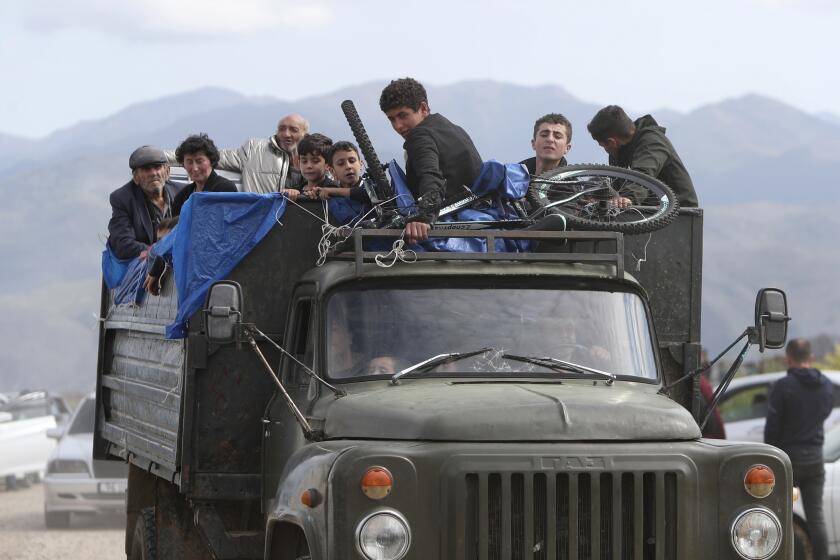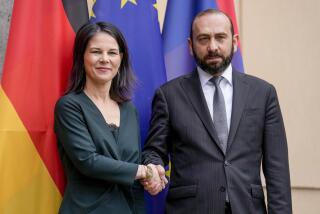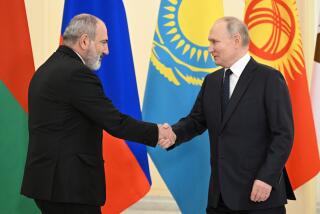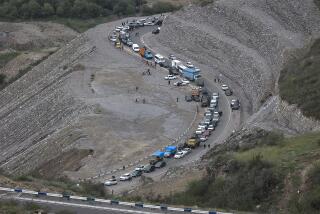Armenia and Azerbaijan move closer to normalizing ties as the first border marker goes up

Armenia and Azerbaijan on Tuesday came a step closer toward normalizing relations after a bitter conflict over territory, as experts in both countries worked to demarcate their boundaries and the first border marker was placed.
The two nations are working toward a peace treaty after Azerbaijan regained full control of the Nagorno-Karabakh region that had been under the control of ethnic Armenian forces since the 1990s and which Armenians called the Republic of Artsakh.
A six-week war in 2020 resulted in Azerbaijan retaking large parts of the breakaway region, and in September, Azerbaijani forces launched a lightning blitz that forced Nagorno-Karabakh’s Armenian authorities to capitulate in negotiations mediated by Russian forces.
Several days ago, Armenia and Azerbaijan reached an agreement over a stretch of border that would cut though four Armenian villages in the Tavush province, meaning that Armenia would cede some territory to Azerbaijan.
Armenian and Azerbaijani authorities on Tuesday announced that the first border marker was installed. It wasn’t immediately clear where exactly it was placed.
In Armenia, protests erupted, and demonstrators blocked roads in the northeastern region through which the proposed border would run. They also set up roadblocks along two key routes elsewhere in the country, including one leading to neighboring Georgia. Photos carried by Armenian and Russian media showed cars and trucks lining country lanes as protesters stood in groups around them.
In 1939, Armenians of Musa Dagh fled to Lebanon rather than submit to Turkish rule. Now they despair over the exodus from Nagorno-Karabakh and Azerbaijan.
And yet, Azerbaijani President Ilham Aliyev said Baku and Yerevan were edging closer to a common understanding of what a peace agreement might look like.
“We are close and maybe closer than ever before” to signing a peace agreement, Aliyev said.
Armenia’s prime minister, Nikol Pashinyan, told British journalists that the two governments “need to convert the theoretical peace agenda into an actual peaceful reality,” according to the Guardian. It’s a message he’s trying to convey to protesters.
Last month, Pashinyan said the Caucasus nation needs to quickly define the border with Azerbaijan to avoid a new round of hostilities. Many residents of Armenia’s border regions have resisted the demarcation effort, seeing it as Azerbaijan’s encroachment on areas they consider their own.
Armenians’ fury over Azerbaijan’s recapture of Nagorno-Karabakh has focused on Armenian Prime Minister Nikol Pashinyan. Could his government go next?
This month, Russia began withdrawing its forces from Nagorno-Karabakh, where they have been stationed as peacekeepers under a truce brokered by Moscow that ended the 2020 war.
The peacekeepers’ duties included ensuring free passage on the sole road connecting Nagorno-Karabakh with Armenia. But Azerbaijan began blocking the road in late 2022, alleging Armenians were using it for weapons shipments and to smuggle minerals, and the Russian forces did not intervene.
After months of increasingly dire food and medicine shortages in Nagorno-Karabakh due to the blockade, Azerbaijan launched its offensive last year. After Azerbaijan regained full control of Nagorno-Karabakh, the vast majority of its population of nearly 120,000 fled to Armenia.
Pashinyan said he was calling for realism in the face of the wide gap between the Armenian and Azerbaijani militaries.
“I was approached by a woman who was forcibly displaced from Nagorno-Karabakh, and she asked how realistic is it that we will have a possibility to go back to Nagorno-Karabakh, and she said: ‘Please give me a direct and candid answer.’ I told her given the perceptions that prevail, I do not consider it realistic,” the Guardian quoted him as saying.
“I cannot lie to you, because if it were realistic, then the displacement from Nagorno-Karabakh would not have happened.”
Los Angeles Times staff contributed to this report.
More to Read
Start your day right
Sign up for Essential California for news, features and recommendations from the L.A. Times and beyond in your inbox six days a week.
You may occasionally receive promotional content from the Los Angeles Times.








